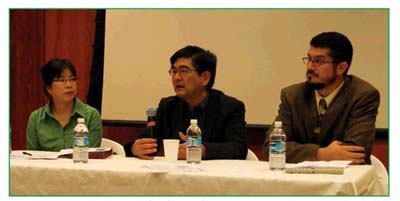 Manzanar panel presentation featured CAIR-LA Executive Director Hussam Ayloush (right) and two Nikkei for Civil Rights & Redress (NCRR) representatives June Hibino and Mark Masaoka. Hibino and Masaoka’s parents were interned during WWII.
Manzanar panel presentation featured CAIR-LA Executive Director Hussam Ayloush (right) and two Nikkei for Civil Rights & Redress (NCRR) representatives June Hibino and Mark Masaoka. Hibino and Masaoka’s parents were interned during WWII. |
Mission Viejo, CA
: On Friday, March 21, the Greater Los Angeles Area office of the Council on American-Islamic Relations (CAIR-LA) held first of its five community forums on “Manzanar Revisited: Civil Rights and Liberties in America” before a packed hall, in conjunction with the Orange County Islamic Foundation (OCIF).
The community forum sought to educate and energize Southland Muslims in preparation for the 39th Annual Manzanar Pilgrimage, a daylong visit to a Japanese American internment camp, which held prisoner more than 10,000 innocent men, women and children during World War II.
Friday’s community forum involved viewing of Filmmaker Taoashi Nakamura’s “Pilgrimage.” It was followed by a discussion that featured CAIR-LA Executive Director Hussam Ayloush and two Nikkei for Civil Rights & Redress (NCRR) representatives, whose parents had been interned.
Ayloush said as our nation continues to face challenges to civil liberties, the Japanese American internment period provides an important lesson in history. “Our country acts at its best when the good people do not remain silent when it is time to speak and act,” he said.
Mark Masaoka talked about tension in the Japanese American community when internment orders were issued. Some felt succumbing to their internment fate and suspending their civil rights was appropriate. Others resisted the camps and risked going against the government’s decree. Those experiences led the way, decades later, for NCRR to create a committee to help build bridges with American Muslims in the post-9/11 climate.
June Hibino told the audience that her parents were interned in temporary locations in Stockton and the Bay Area until permanent camps could be built. The horrific experience left camp survivors scarred in many ways.
Her generation -- the Sansei – wished to explore its roots and thus, went on the Manzanar pilgrimage in the late 1960s.
“We were affected a lot by the times, by the civil rights movement,” Hibino said. “We wanted to know about our history and our culture. We wanted to understand who we were in America and what our identity was. Those efforts led to visits to Manzanar, starting up Asian studies and ethnic studies programs, etc.”
The presenters also emphasized forming alliances with other civil rights, interfaith groups and not shying away from legally challenging civil rights abuses.
Imam Yassir Fazaga, religious director of OCIF, thanked the speakers and encouraged people to join the upcoming pilgrimage on April 26, 2008.
“This is probably one of the most important and provocative programs we have had at this mosque,” Fazaga said. “In order for us to celebrate our diversity, we must appreciate each other’s contributions and acknowledge each other’s struggles.”
-------------------------------------------------------------------------------------

